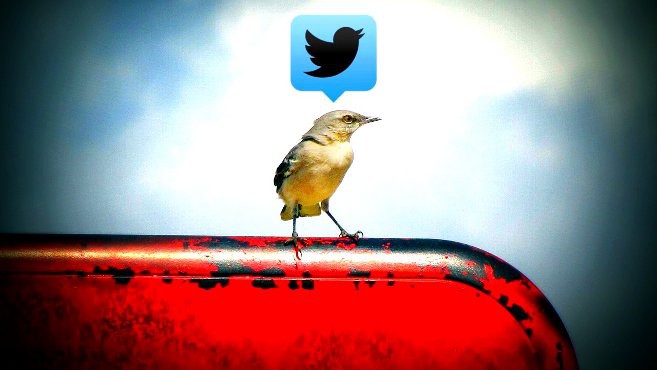
With activists as diverse as Chinese artist Ai Weiwei and Mi’kmaq lawyer Pam Palmater mobilizing social change on Twitter, it’s no surprise that tweeting has acquired a revolutionary sheen, albeit tarnished by Twitter’s facilitation of country-specific censorship of tweets in 2012. Since emerging in 2006, Twitter has become a tactical tool of popular uprisings against repressive regimes (Arab Spring), against capitalist greed (Occupy Wall Street), and against the settler-colonial state (Idle No More). It promises to turn everyone into a just-in-time social commentator who relays events as they unfold on the ground, subverting the authoritative version relayed by the mainstream media. In the face of such promise, it might seem pesky to pick trouble with Twitter. But for two reasons, I protest the idea of Twitter’s protest value.
The first concerns the image of a social network ecology that has been cultivated by the Twitter empire. The ruling conceit of the Twitterverse – which boasted 500 million registered users in 2012 – is the avian ecology of birdsong. The billions of tweets sent by humans on a range of hardware devices are likened to the short, sweet, and, above all, spontaneous memes emitted from the feather-breasted. In likening technologically mediated, long-distance human talk to the innocent ecology of birdsong, Twitter performs a magic trick with public perception, disappearing the material costs and conditions of tweeting. Environmental NGOs with Twitter accounts perhaps most paradoxically buy into the illusion that social networking transcends resource extraction.
Along with tweeting, the masterful rhetoric of the ethernet, cloud computing, and the blogosphere encourages the popular belief that digital communication is an immaterial transaction of bodiless data. Even in the 20th century, telecommunication seemed like magic; the electrical cables making it possible vanished beneath the appearance of spontaneous connection. In our wireless times, the material conditions of human connectivity are even more easily occulted. Seemingly immaterial data appears to volley as benignly as birdsong between members of the Twitterverse.
Against the illusion of the airy tweet, it’s vital to recall that massive electricity-sucking data storage centres and server farms underpin virtual networks and that, like industrial factories, these farms are often strategically located next to cheap sources of available energy (coal, hydroelectric). Ironically, tweeting depends upon the energy regimes that are often the tweets’ objects of protest. Yet there’s been little scrutiny by Twitter’s users of the ecological conditions of digital communication.
Some may recall a 2001 campaign mobilized by a group of Belgian NGOs under the banner “No blood on my mobile! Stop the plundering of Congo!” The campaign drew attention to the “cost of a call” by linking mobile phone companies like Nokia to the illegal mining of coltan in the eastern Congo, which in turn was implicated in the country’s devastating civil war and the plundering of its environment. Could a similar investigation of the socio-ecological cost of social media be initiated by Twitter activists? Or is tweeting perhaps too invested in a fantasy of free, unlimited communication to serve as the platform for such a discussion?
The second reason for protesting Twitter’s protest value concerns its enmeshment in a larger political economy: the modes of production and social relationships of capitalism. In the history of modern capitalism, labour protests often involved resistance to the pace of production. Think of the sit-down strikes deployed by workers in Fordist factories to protest speed-ups on the assembly line. If the continuous speeding up of production and consumption is one of the hallmarks of a market economy (Slow Movements are a response to this), doesn’t the love of high-speed communication suggest that social networking is more bound up in capitalist logics than we may like to admit?
Fordist modes of production have now been outstripped by modes of flexible, just-in-time production (Toyotism) in which commodities are “instantly” assembled on demand, rather than being supplied from a bulky stockpile. Not coincidentally, human social life has likewise sped up as technological platforms like Twitter facilitate just-in-time communication. The economy and speed of the 140-character tweet has made it a tool of choice for activists, particularly those navigating potentially deadly encounters with the police on a street level. Yet the instantaneity of tweeting is also where social networking most conforms to the pace of capitalist production. The very social lives of individuals and movements risk replicating the values of the dominant market economy even as they agitate for change.
It’s always worth asking how the pace and means of new modes of communication potentially contradict their promised, liberating ends. Human tweeting for social change is only liberating if it isn’t at the expense of the birds – that is, at the cost of the lively, non-human social ecologies that it takes as its model.






